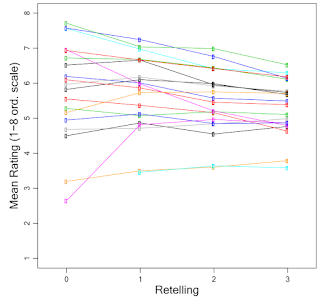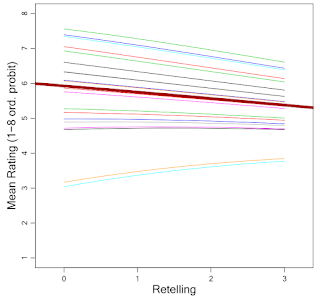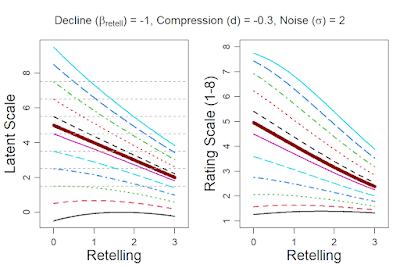One reason I love Bayesian software (such as JAGS, etc.) is for its ability to express novel models that aren't prepackaged in canned stats packages. In some recent research, I had the opportunity to create a novel trend model and estimate its parameters in JAGS.
We had data as graphed in Fig. 1, and I had to think of a model to describe the trends
 |
| Fig.1. Data to be modeled. |
The variable on the vertical axis is a rating of emotion (such as sadness, happiness, etc.) in short stories. The horizontal axis is the retelling of the story, such that 0 is the original story, 1 is a retelling of the original, 2 is a retelling of the 1st retelling, and 3 is a retelling of the 2nd retelling. Retellings tend to lose a lot of information but nevertheless retain some info too. Do they retain emotions? Each curve in the graph corresponds to a different original story. I thought the trends in the data looked like the different original stories were converging toward (or diverging from) a common spine, as in Fig. 2:
 |
| Fig. 2. Model predictions. |
So, I invented a simple trend model to express that idea, and I programmed it in JAGS. Because the ratings were on an ordinal scale, I used an ordered-probit response distribution on a latent scale that followed an underlying linear spine with exponential convergence, as suggested in Fig. 3:
 |
| Fig. 3. The model, with latent scale in left panel and rating scale in right panel. |
You can read all the details of the model in the HTML document at https://osf.io/nbuxg/ (download the HTML document and then view it in a browser). The published article describing the research is titled Serial reproduction of narratives preserves emotional appraisals by Fritz Breithaupt, Binyan Li, and John K. Kruschke. It can be obtained from https://doi.org/10.1080/02699931.2022.2031906 and the final pre-publication manuscript is at https://osf.io/hwvza/.
